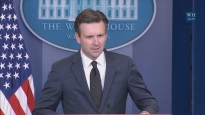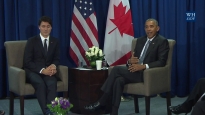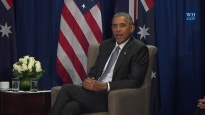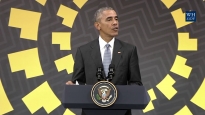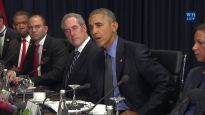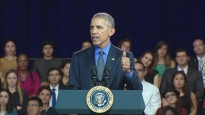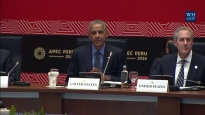President Obama on Bilateral Mideast Peace Meetings
September 01, 2010 | 9:05 | Public Domain
President Obama expresses optimism after meeting with the leaders of Israel, the Palestinian Authority, Jordan and Egypt, resuming direct negotiations towards a more peaceful Middle East.
Read a translation: Arabic | Hebrew
Remarks by the President in the Rose Garden after Bilateral Meetings
WITH PRIME MINISTER NETANYAHU OF ISRAEL,
PRESIDENT MAHMOUD ABBAS OF THE PALESTINIAN AUTHORITY,
HIS MAJESTY KING ABDULLAH OF JORDAN,
AND PRESIDENT HOSNI MUBARAK OF EGYPT
Rose Garden
5:27 P.M. EDT
THE PRESIDENT: Good afternoon, everybody.
Upon taking office, I declared that America is a friend of each nation and every person who seeks a future of peace and dignity, and that the United States was ready to lead in pursuit of that future. At the beginning of my administration, I stated that it was our policy to actively and aggressively seek a lasting peace between Israel and the Palestinians, as well as a comprehensive peace between Israel and all of its Arab neighbors. And to support my outstanding Secretary of State, Hillary Clinton’s leadership, I appointed a special envoy and one of our nation’s finest statesmen, former Senator George Mitchell, to guide our efforts.
As I’ve said many times, our goal is a two-state solution that ends the conflict and ensures the rights and security of both Israelis and Palestinians. And despite the inevitable challenges, we have never wavered in pursuit of this goal. I’ve met with Israeli Prime Minister Benjamin Netanyahu and Palestinian Authority President Mahmoud Abbas on numerous occasions. Between them, Secretary Clinton and Senator Mitchell have made countless trips to the region.
Over the past year, both the Israeli government and the Palestinian Authority have taken important steps to build confidence. And with Senator Mitchell’s support, Israelis and Palestinians have engaged in several rounds of proximity talks -— even in the face of difficult circumstances. But we’ve always made it clear that the only path to lasting peace between Israelis and Palestinians is direct talks between Israelis and Palestinians.
Tomorrow, after nearly two years, the parties will relaunch those direct talks.
Today, I had a series of very productive meetings with key partners in this effort. I urged Prime Minister Netanyahu and President Abbas to recognize this as a moment of opportunity that must be seized. I thanked President Mubarak of Egypt and His Majesty King Abdullah of Jordan, for their valuable leadership and for the support that will be necessary going forward. And I look forward to hosting these four leaders at a private working dinner at the White House tonight.
I also want to take this opportunity to express our gratitude to many friends and allies, especially our Quartet partners. And former Prime Minister Tony Blair will be joining us as representing the Quartet at the dinner this evening.
The purpose of these talks is clear. These will be direct negotiations between Israelis and Palestinians. These negotiations are intended to resolve all final status issues. The goal is a settlement, negotiated between the parties, that ends the occupation which began in 1967 and results in the emergence of an independent, democratic and viable Palestinian state, living side by side in peace and security with a Jewish state of Israel and its other neighbors. That’s the vision we are pursuing.
Now, I know these talks have been greeted in some quarters with skepticism. We are under no illusions. Passions run deep. Each side has legitimate and enduring interests. Years of mistrust will not disappear overnight. Building confidence will require painstaking diplomacy and trust by the parties. After all, there’s a reason that the two-state solution has eluded previous generations —- this is extraordinarily complex and extraordinarily difficult.
But we know that the status quo is unsustainable -- for Israelis, for Palestinians, for the region and for the world. It is in the national interests of all involved, including the United States, that this conflict be brought to a peaceful conclusion.
So even as we are clear-eyed about the challenges ahead, so, too, do we see the foundation for progress. The Israeli government and the Palestinian Authority are already cooperating on a daily basis to increase security and reduce violence, to build institutions and improve conditions on the ground.
Among the Israeli and Palestinian publics, there is wide support for a two-state solution, the broad outlines of which are well known to both peoples. And even in the midst of discord, ordinary Israelis and Palestinians -— faith leaders, civil society groups, doctors, scientists, businessmen, students -- find ways to work together every day. Their heroic efforts at the grassroots show that cooperation and progress is possible and should inspire us all.
In addition, Prime Minister Netanyahu and President Abbas are two leaders who I believe want peace. Both sides have indicated that these negotiations can be completed within one year. And as I told each of them today, this moment of opportunity may not soon come again -— they cannot afford to let it slip away. Now is the time for leaders of courage and vision to deliver the peace that their people deserve.
The United States will put our full weight behind this effort. We will be an active and sustained participant. We will support those who make difficult choices in pursuit of peace. But let me very clear. Ultimately the United States cannot impose a solution, and we cannot want it more than the parties themselves. There are enormous risks involved here for all the parties concerned, but we cannot do it for them. We can create the environment and the atmosphere for negotiations, but ultimately it’s going to require the leadership on both the Palestinian and the Israeli sides, as well as those in the region who say they want a Palestinian state.
A lot of times I hear from those who insist that this is a top priority and yet do very little to actually support efforts that could bring about a Palestinian state.
So only Israelis and Palestinians can make the difficult choices and build the consensus at home for progress. Only Israelis and Palestinians can prove to each other their readiness to end this conflict and make the compromises upon which lasting peace deserves.
What the rest of us can do, including the United States, is to support those conversations, support those talks, support those efforts -- not try to undermine them.
So the hard work is only beginning. Neither success nor failure is inevitable. But this much we know: If we do not make the attempt, then failure is guaranteed. If both sides do not commit to these talks in earnest, then the longstanding conflict will only continue to fester and consume another generation. And this we simply cannot allow.
We know that there will be moments that test our resolve. We know that extremists and enemies of peace will do everything in their power to destroy this effort —- as we saw in the heinous attacks near Hebron, which we have strongly condemned. But we also know this: Too much blood has already been shed. Too many lives have already been lost. Too many hearts have already been broken.
And despite what the cynics say, history teaches us that there is a different path. It is the path of resolve and determination, where compromise is possible, and old conflicts, at long last, can end. It is the path traveled by those who brought peace to their countries, from Northern Ireland -- where Senator Mitchell was so deeply involved -- to the Balkans, to Africa, Asia, to those who forged peace between Israel and Egypt and Israel and Jordan.
This path is open to Israelis and Palestinians. If all sides persevere, in good faith and with a sense of purpose and possibility, we can build a just, lasting and comprehensive peace in the Middle East.
Thank you very much.
END
5:35 P.M. EDT
|
November 22, 2016
|
November 22, 2016
|
November 20, 2016
|
November 20, 2016
|
|
November 20, 2016
|
November 19, 2016
|
November 19, 2016
|
November 19, 2016
|
- &lsaquo previous
- …
- 6
- 7
- 8
- 9
- 10
- 11
- 12
- 13
- 14
- …
- next &rsaquo

